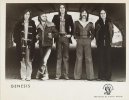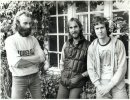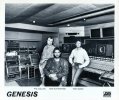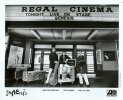“Turn it off again” - Alan Hewitt takes a look at some of the least popular tracks from the band’s catalogue. Photographs courtesy of Brian Roberts, Charisma and Atlantic Records, Armando Gallo, Gered Mankowitz, David Scheinmann and Stuart Dean.
Yes folks, instead of focussing on the great success stories of the band’s catalogue - and those of the solo members as well - I thought it might prove interesting (and possibly a tad controversial as well) to cast a light into those dim and dark corners of the band’s oeuvre which have not titillated us as much as some of their other creations have. I state here and now that these are purely and simply my own opinions, feel free to disagree with them at your leisure if you wish…
A band as notorious for quality control as Genesis were during their career has ensured that in the first instance many tracks lacking that essential “spark” were relegated to B side status in the first place or in the case of so many early songs, not released at all and conveniently “lost” . And so, if we begin, as all good tales do at the start, then which items from the band’s earliest output fit into this feature?
Well, the band’s first album, From Genesis To Revelation itself has nothing which is offensive to these ears of mine and so, I have to look at those tracks which were subsequently exhumed from the archives for the first Genesis Archive set back in 1998. Of these, there are several tracks which make me cringe when I hear them and no doubt, the band themselves may have felt about them in the same manner hence their exile to the vaults for so long. |
 “The boys considering the artistic merits
“The boys considering the artistic merits
of magic mushrooms, perhaps… ?” |
|
Among them are such classics of the juvenile songwriter’s art as Hey!, Sea Bee and Hair On The Arms And Legs. The band have always consistently denied the use of any mind altering substances during their career but even so, there must have been something going on to permit such lyrical aberrations as we can hear on these tracks although musically they are competent enough, lyrically they are probably among the band’s worst. Another contender is Build Me A Mountain in which the band are evidently aping The Crazy World Of Arthur Brown but with none of the concomitant excitement. Nor does their sad tale of an ageing alcoholic - Twilight Alehouse which is of a similar vintage (pun intended) endear itself much to these ears and I still find it amazing that both of these were still regular concert favourites as late as 1972, but there is no accounting for taste eh?
Moving forward a couple of years agriculturally speakin’we come to the first album from the classic Banks/Collins/Gabriel/Hackett/Rutherford line up - 1971’s Nursery Cryme. An album replete with acknowledged classics in the Genesis canon and yet, even here there are a couple of clunkers to be heard. How on earth a song as mediocre as Seven Stones made it to the same album as The Musical Box is beyond me. Lyrically and musically this is substandard stuff. Even the weird and wacky Happy The Man had more going for it than this one. Harlequin too is a strange choice for an album so full of power and drama but it at least has the redeeming quality of being quite innocuous.
Foxtrot should have been the Gabriel era band’s definitive album but even here there is room for at least one track which should have been relegated to B side status. In this case it is Can Utility & The Coastliners. This witty re-telling of the story of King Cnut should work but the music and lyrics fail to marry up which always leaves this listener unsatisfied when hearing it. |
|
|
The same can be said for a couple of tracks on the next album from the band - 1973’s Selling England By The Pound. Their penchant for extended storytelling and musical extemporisation definitely got the better of them in the telling of the gangland Battle Of Epping Forest. Once again, as with Can Utility … there is simply too much going on both musically and lyrically for it to reach any kind of satisfying climax.
What possessed the band to include Aisle Of Plenty on the album, apart from the obvious link to its title is beyond me too and this probably rates as the weakest track the band have ever penned to my mind.
| And so we come to the opus that most Genesis fans worship regularly - The Lamb Lies Down On Broadway, Peter’s final statement with the band and one which undoubtedly contains some of the finest music written during his tenure with the band. However, his epic flight of fantasy involving the streets and sewers of New York also contains some of the least satisfying music from the band’s oeuvre. Such trifles as The Grand Parade Of Lifeless Packaging, the atonal The Waiting Room (yes, even though it is the title of this very website I detest it with a passion!), Silent Sorrow In Empty Boats, and such lyrical “gems” as The Colony Of Slippermen and It although mildly amusing, do not leave me in the slightest bit titillated (to paraphrase from Peter’s narration during the live performances of the album). A Judicious pruning of this epic would certainly have resulted in a much more satisfying result as far as I am concerned (I am donning flameproof jacket and Kevlar vest as I type this!). |
|
The Post Gabriel era albums have also proven to be equally as prone to the occasional clunker although it has to be said, as far as I am concerned, their first album after Peter’s departure, 1976’s A Trick Of The Tail is the closest they probably came to the elusive “perfect” album. There is nothing on it which is not worthy of its place and even the one solitary B side - It’s Yourself has musical merit.
Now we come to what most of you will already know as the album I regard as the pinnacle of the band’s output - 1977’s Wind & Wuthering. Sadly, this album is blighted by two errors. Why, oh why, did the inane doodle Wot Gorilla? gain admission to the album over the superb Inside & Out? A mystery we shall perhaps never know the answer to although speculation has always been rife and no doubt always will be but as a result, this marvellous album will never be as entirely satisfying to me as it otherwise would have been. Of the other B sides from this album, Match Of The Day is a track which I can live without and Pigeons, despite its wry reflection on music critics and their barbs, is not one which will ever set the world alight. |
|
|
1978 and the band’s first album without Steve - And Then There Were Three and once again, to my ears there is nothing on the album which does not deserve to be there and indeed, this album represents some of the band’s strongest work as far as I am concerned. Of the B sides, Vancouver, the band’s very own “She’s Leaving Home” is charming but lightweight whilst The Day The Light Went Out is very much a poor man’s Watcher Of The Skies and deservedly relegated to B side status.
| 1980’s Duke album, was perhaps one of the band’s most important albums. The transition from cult band to major one begun with the last album, was completed with this one. Mixing the prog elements in the likes of Cul De Sac and Heathaze with the rockier side to the band as so clearly displayed in Turn It on Again and Duke’s Travels/Duke’s End here we have an album with something for everyone on it - including (shock horror) a pop song - Misunderstanding. The B sides from this album - Open Door and Evidence Of Autumn, are both among my favourite tracks by the band but are both very much cast in the old mould of the band and so I completely understand their relegation to B side status - although I do not necessarily agree with it! |
|
And so we come, at last, to my favourite Frisbee. Yes, the album I loathed so much that I turned it into one of those objects after first hearing it. 1981’s Abacab album divided fans probably the most since The Lamb … and it certainly deserves the criticism that has been aimed at it in so many quarters since its release. The band’s realisation that they could not continue to produce the Prog epics of yore in the new musical environment of the early 1980’s certainly led to some brave musical decisions not least the inclusion of the Phoenix Horns on several tracks.
However, it also led to the inclusion of some truly awful music. At the head of this list must come Who Dunnit. Without doubt the most despicable piece of “music” the band ever released. Tongue in cheek, piss-take or whatever else you wish to call it to justify its existence, it does not under any circumstances, deserve a place on a record bearing the Genesis imprint. It is not alone in this however, as both Like It Or Not and Another Record are both mediocre in extreme, the latter in particular being a turgid dirge of a tune. What is even more appalling is that better tracks were available for consideration as the subsequent 3 x 3 EP demonstrated. Any of the three tracks on that would have been infinitely preferable to the trio mentioned above. |
 “Reading the critical reaction
“Reading the critical reaction
to Who Dunnit…” |
| 1983 and that difficult twelfth album the eponymously titled Genesis (or “Shapes/Mama” as most fans refer to it). With solo careers by now burgeoning (more of that next time) it was evident that the band were struggling for material with this one as evident by the lack of studio B side material. That said, some of the tracks on the eventual release would and indeed, in my opinion, should have been relegated to that category. Of these, Illegal Alien has to be the worst offender. OK, so it was meant as a piss-take but even so, musically and in the accompanying video, it sees the band reach a new low but that is easily surpassed by the track which grates on my nerves like fingers on a blackboard, the singularly inappropriately titled It’s Gonna Get Better (oh, no it doesn’t!) I really don’t have the words to describe how much I dislike this track! |
|
| 1986 and the second album to achieve the notorious Frisbee status - Invisible Touch. Just like Abacab, I heartily detested this album upon first hearing it. I love it now by the way. Even so, there are a handful of niggling tracks which I simply do not and never have liked on it. Of these, Anything She Does and Throwing It All Away are the worst offenders, even though the former has the redeeming feature of comic icon Benny Hill’s appearance in the promo clip made for it, the song itself is simply appalling whilst Throwing It All Away and its grating chorus ensures that whenever it is performed either by the band or any of the various Genesis tribute bands around these days, I make a sharp exit to the loo or the bar! In addition to these there are the various remixes and 12” versions of songs all of which do absolutely nothing for this listener I’m afraid. The band also committed the unforgivable error of leaving what is perhaps the last truly great Prog song they wrote off this album - Feeding The Fire alongside a truly excellent instrumental - Do The Neurotic - what were you thinking guys??! |
|
And so we come to Phil’s final album with the band, 1991’s We Can’t Dance and only their second double studio album in their entire career. Replete with a healthy mix of long and short form classics. However, two tracks on this one also grate on my nerves - Hold On My Heart and Since I Lost You both of which are so cloyingly sentimental they make me gag whenever I hear them.
Of the B Sides, the proper studio tracks are uniformly excellent and none of them would have been out of place on the album. The increasing use of 12” and alternative mixes to fill in gaps led to the appearance on this album of several unimpressive examples of such things of which the worst is the so-called “Sex Mix” of I Can’t Dance which is banal in the extreme. |
|
| That leaves us with the all too brief tenure of Ray Wilson as front man for the band and 1997’s criminally underrated Calling All Stations album. The album itself contains several impressive offerings but even here there are one or two tracks which are far from the standard one would expect of a Genesis album. Surprisingly enough two of these ended up as singles. Congo, which was to be the lead off single from the album is irritatingly naff with a singalong chorus not worthy of Genesis, whilst Shipwrecked is simply far too lightweight for the darker feel of the album. It is even more irritating when one realises that of the bona fide b sides from the album sessions there are several tracks, Run Out of Time and Nowhere Left To Turn in particular which would easily have fitted more easily and comfortably into the album. However, the B sides did also spawn two appallingly bad tracks too: Papa He Said and Banjo Man both of which are best forgotten. |
|
And there you have it, yours truly’s least favourite Genesis moments. But what of the solo members, I hear you cry? Well, I will be coming to those next time folks …












